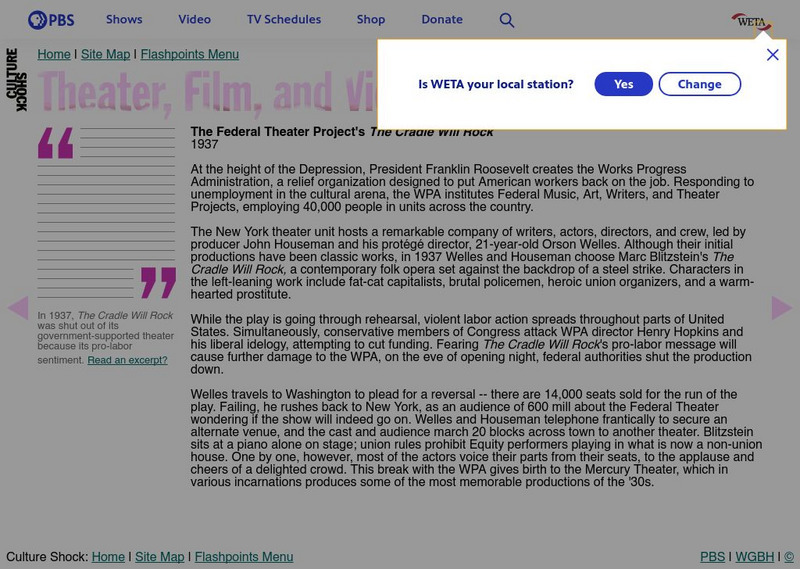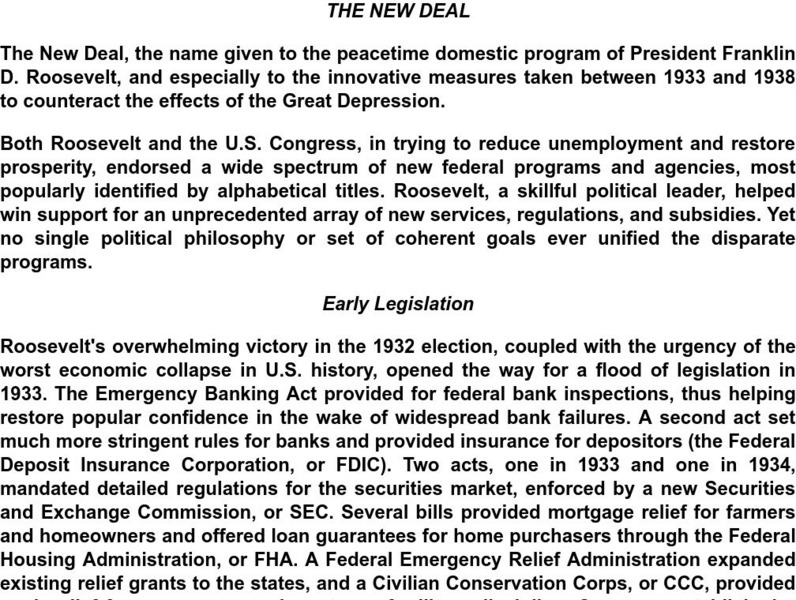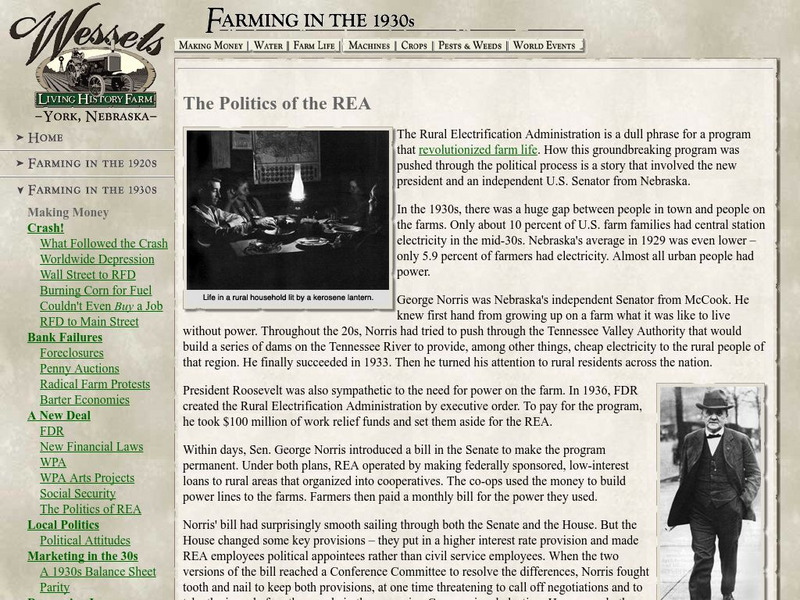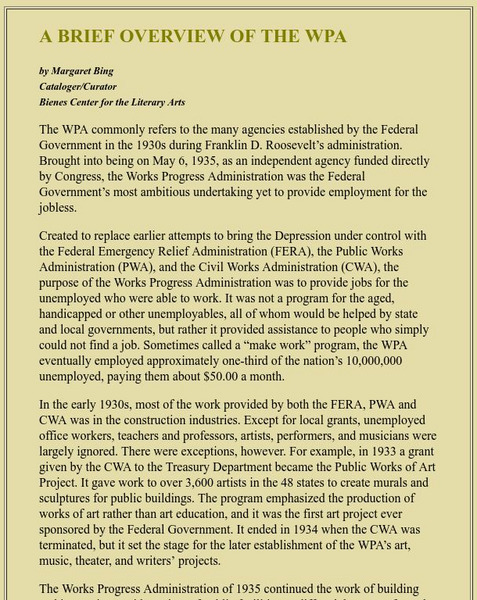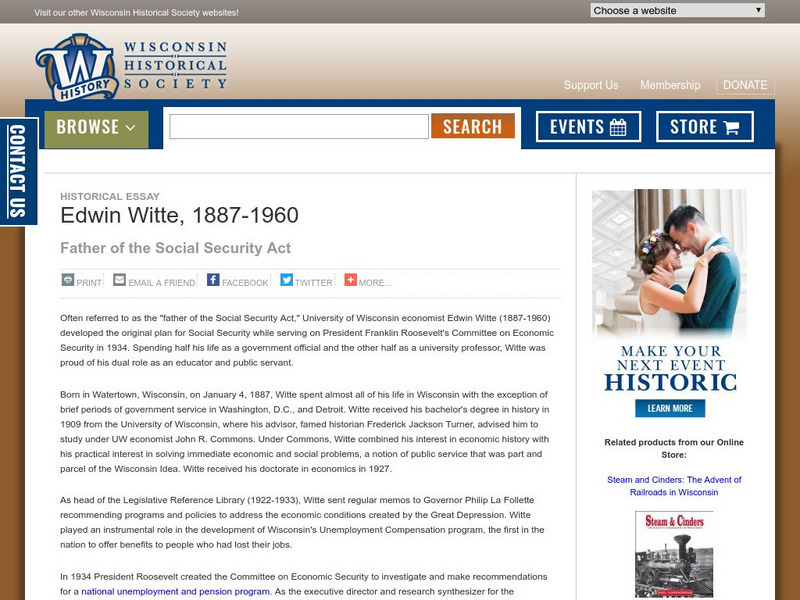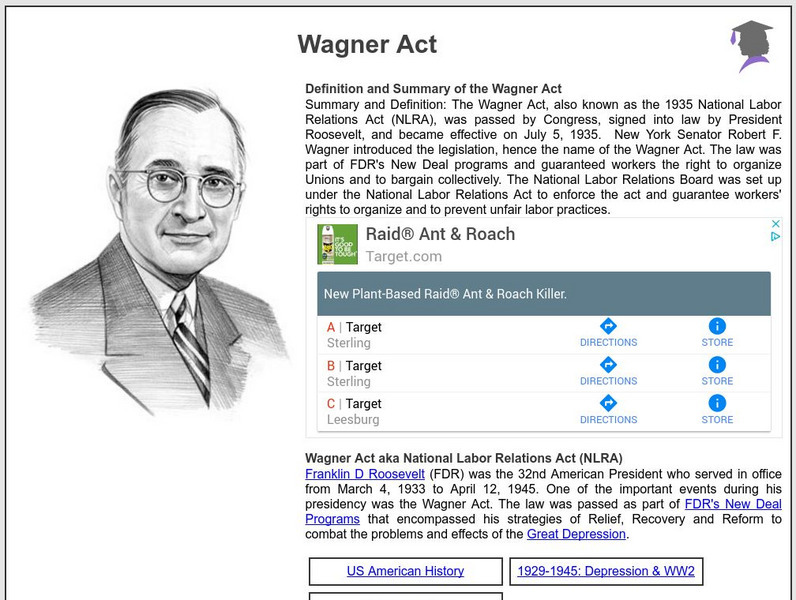US National Archives
Nara: A New Deal for the Arts: Rediscovering America
As part of the artistic nationalism that took place during the Great Depression, this website from the National Archives and Records Administration focuses on many American scenes. Lots of focus on small-town life and various regions.
US National Archives
Nara: A New Deal for the Arts Activist Arts
The turbulence of the Great Depression is reflected in these images of workers in artwork from the NARA on this site.
US National Archives
Nara: Social Security Act
See the first page of the Social Security Act from the National Archives date stamped August 12, 1935. FDR signed the act into law two days later.
PBS
Flashpoints: The Federal Theater Project's the Cradle Will Rock
This PBS site provides background information on the events happenning around the US that might have attributed to communist scare brought on by the Federal Theater's musical "The Cradle Will Rock".
New Deal Network
New Deal Network: Work Study Live: The Resident Youth Centers of the Nya
This essay will take its readers on a journey through the development and subsequent closing of a National Youth Administration (NYA) resident youth center in Lima, New York. Author Gordon Halstead, director of the center, provides a...
Wisconsin Historical Society
Wisconsin Historical Society: A Brief Explanation of the Social Security Act
The Social Security Act was brought into law in 1935. This booklet was published by the government in 1935 to explain how the Act worked.
New Deal Network
New Deal Network: Great Depression and the Arts
Part of a wonderful website devoted to researching and teaching the Great Depression and the New Deal. These pages are focused specifically on the arts during this time.
Other
Nyit: School of Management: New Deal
Explains the programs instituted by FDR between 1933 and 1938 to curb the effects of the Great Depression. Lists and briefly defines such programs as the Agricultural Adjustment Act, WPA, National Housing Act, etc.
Wessels Living History Farm
Living History Farm: Farming in the 1930s: The Politics of the Rea
Electrifying rural America revolutionized farm life. Read about how the Rural Electrification Administration was instituted and what had to be done to encourage rural families to form electric co-ops. Included is an interview with a...
University of Virginia
Miller Center at Uva: u.s. Presidents: Fdr: Anna Eleanor Roosevelt, First Lady
This site from the Miller Center of Public Affairs gives a detailed biography of the life of First Lady Eleanor Roosevelt. The page also provides links to the biography of her husband, Franklin Delano Roosevelt, as well as his Cabinet...
Other
Bienes Center for the Literary Arts: A Brief Overview of the Wpa
Read descriptions of the various programs for unemployed artists that were part of the Works Progress Administration.
Other
New Deal Narratives: History of the Farm Security Administration
Part of a larger narrative about the New Deal. This is a brief history of the Farm Security Administration. An important part of the role of the FSA was photographic documentation of farming in the 1930s and 1940s.
Pennsylvania Historical and Museum Comission
Explore Pa History: Rural Electrification, Crawford County Historical Marker
Read about the attempt to bring electricity to rural Pennsylvania during the Great Depression with the help of the New Deal program, the Rural Electrification Administration.
Digital History
Digital History: New Deal Programs [Pdf]
Here's an exercise in which students use data provided about possible New Deal programs and lets them decide which are economically feasible and helpful as a way to address the Great Depression. Use the provided chart to keep track of...
Digital History
Digital History: Jobs Programs
The major aspect of the Great Depression was the rampant unemployment. Read about the many jobs programs that were part of the New Deal that provided employment for millions of needy Americans.
US National Archives
Nara: Guide to Federal Records: Rural Electrification Adminstration [Rea]
This is the online guide to federal records in the National Archives pertaining to the Rural Electrification Administration.
Wisconsin Historical Society
Wisconsin Historical Society: Edwin Witte, 1887 1960
Edwin Witte was known as the founder of Social Security, having created the plan for it when he worked on the Committee on Economic Security under President Franklin Roosevelt. This is a biography of his life.
Library of Congress
Loc: Manuscripts From the Federal Writers' Project
The Folklore Project of the Federal Writers' Project used personal stories as the basis for anthologies which would form a portrait of various groups of people in America. Click link to manuscripts from the FWP, 1936-1940. You can listen...
ClassFlow
Class Flow: Picture Review of the 1930's
[Free Registration/Login Required] This flipchart can be used to introduce or review the major aspects of the 1930's, including the Stock Market Crash, Hoover's presidency, the Bonus Army, the Dust Bowl, FDR and his New Deal Programs.
ClassFlow
Class Flow: Great Depression
[Free Registration/Login Required] This flipchart is an overview of the causes and impact of the Great Depression and the effects of the New Deal. Included are many photographs from the time.
US Senate
U.s. Senate: Robert Wagner: A Featured Biography
Short biographical essay on Robert F. Wagner, author of the Social Security Act and the Wagner Labor Act.
Siteseen
Siteseen: American Historama: Wagner Act
Provides interesting facts and information about the 1935 Wagner Act (National Labor Relations Act), a New Deal reform that guaranteed workers the right to organize unions and to bargain collectively.
Siteseen
Siteseen: American Historama: Social Security Act of 1935
Provides 15 detailed facts and a summary of one of the most important elements of FDR's New Deal program, the Social Security Act of 1935.
Siteseen
Siteseen: American Historama: Civilian Conservation Corps
Discover interesting facts and information about the Civilian Conservation Corps that was established to employ young men to work on conservation projects and was created as part of FDR's New Deal Programs.



